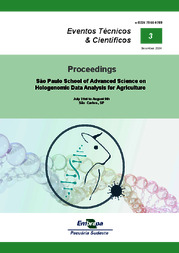Proceedings...
Proceedings...
Summary: Abstract: As the global population continues to grow, the demand for crop and livestock products is also expected to increase. At the same time, climate change and other environmental factors create new challenges for the agricultural industry. For example, changing weather patterns and extreme weather events can impact feed availability, disease incidence, and productivity. To address these challenges, there is a growing interest in developing new approaches to improve agriculture’s productivity and sustainability. Studying the microbial community associated with a host is a new research field that can help understand what is needed for the necessary improvements. Using high-throughput technologies such as next-generation sequencing and large-scale-based metabolomics, we can comprehensively analyze the microbiome and associate these data with the host’s genomic, epigenomic, transcriptomic, proteomic, and metabolic profile. These approaches enable researchers to analyze the complex microbial communities associated with agricultural species at a systems-level, providing a more comprehensive understanding of their composition and function. By identifying key microbial players, it may be possible to develop targeted interventions that can help modulate the microbiome and improve host health and productivity. In addition, developing and incorporating more sophisticated analytical methods, such as artificial intelligence and language models, further enhance our ability to analyze the vast amounts of data generated by these approaches. For example, machine learning algorithms can identify patterns in the data and predict which interventions are likely to be most effective, which could accelerate the development of new treatments and management strategies. Integrating omic and meta-omic approaches with advanced technologies can transform the food production industry, enabling more efficient, sustainable, and environmentally friendly production practices. As it is imperative that graduate students have access to such knowledge, the “São Paulo School of Advanced Science on Hologenomic Data Analysis for Agriculture’’ came to provide students and young researchers an interdisciplinary vision of hologenomics and state-of-the-art knowledge on how to analyze and integrate the analysis of different omics. Furthermore, this school also discussed how these tools could improve the development of new agricultural management strategies.
Publication year: 2024
Types of publication: Annals and event proceedings (as a whole)
Keywords: Agricultura, Análise de Dados, Ciência avançada, Congresso
Observation
Some of Embrapa's publications are published as ePub files. To read them, use or download one of the following free software options to your computer or mobile device. Android: Google Play Books; IOS: iBooks; Windows and Linux: Calibre.
Access other publications
Access the Agricultural Research Database (BDPA) to consult Embrapa's full library collection and records.
Visit Embrapa Bookstore to purchase books and other publications sold by Embrapa.

